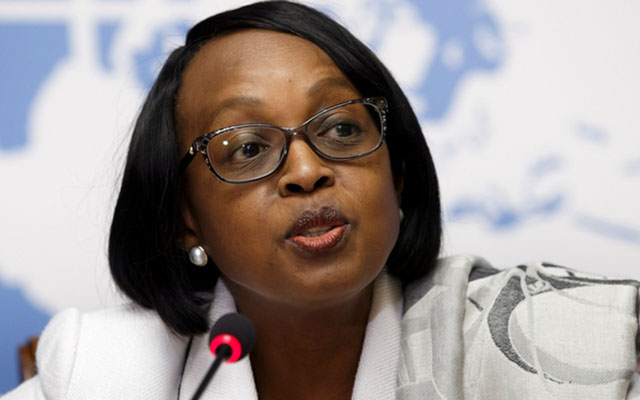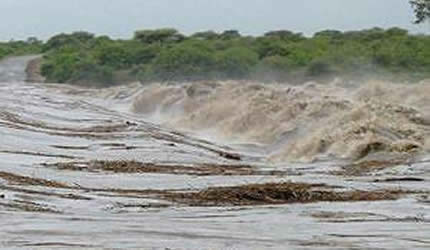‘Universal health coverage possible’

THE INTERVIEW: Paidamoyo Chipunza
Zimbabwe successfully hosted the 67th Session of the World Health Organisation Regional Committee meeting for Africa in Victoria Falls from August 28 to September 1, 2017. The regional committee, comprising health ministers from 47 countries in the region, is the governing body of WHO in the African Region which seeks to domesticate international agreements to the African setting. Our Senior Health Reporter Paidamoyo Chipunza (PC) talks to WHO regional director for Africa Dr Matshidiso Moeti (MM) on health issues deliberated on and commitments made by the African health ministers.
PC: This is the 67th session of these regional committee meetings, can you shed more light on the objectives and their relevance to challenges affecting the African region?
MM: The regional committee is a governing body of the World Health Organisation, in this case in Africa. It is the forum where the ministers, the governments talk among themselves as an intergovernmental forum to address priorities of health challenges, of health in the region.
They then interact with the Secretariat in order to agree on actions to be taken in the countries and the actions that the Secretariat has to take in order to support what’s happening in countries.
In addition to that it is big, if you like, forum of interaction and dialogue between the different partners who work on health not just WHO and the countries, the ministers and the senior officials.
PC: So in terms of who participates at this forum, the countries through the Ministries of Health and who else?
MM: Yes it is the countries, it’s some regional political organisations like the African Union Commission was here represented by Professor Amira Elfadil (commissioner for social affairs) and her team so that other regional economic communities participate, as well as partners, health people and some technical agencies, international organisations, some of the bilateral partners that we have, people here from the US government, the UK government, German government as well as UNICEF, UNFPA and some professional associations that are working on different aspects of health and the private sector, some of the pharmaceutical companies that are donating medicines for neglected tropical diseases organise with WHO.
PC: And what was on the agenda of this year’s session of the regional committee meeting?
MM: There was a range of issues on the agenda for this year’s session, we talked about universal health coverage, and we were presenting a framework for coverage of universal health coverage.
We talked about outbreaks and emergencies and health security. There was a review of the international health regulations of the global strategies on the ministers of the region who were able to get their inputs on the finalisation of the global strategy.
We talked about non-communicable diseases (NCDs), sexually transmitted infections, these are some of the areas where progress really needs to be stepped up, so we talked about the range, the priority problems.
You know we have a new Director-General of WHO so he is coming in at a point where there is need to develop what we call a general programme of work, that’s a broad strategy looking at the people who work for WHO for ten years.
So the first draft of that was discussed by the ministers, and they made their inputs and we also talked about the programme of budget for the next two years meaning what are the priorities? How much money are we going to be allocating for joint action between WHO, the countries and the partner?
PC: To what extent were your expectations for the meeting met?
MM: I think very much with my experience in this, it’s to a larger degree. We have extremely good quality today by the ministers; I think the understanding of the key issues that affect health.
First of all, the priorities in health, the big problems in health, the big challenges countries are facing in order to speed up improving the health of their population and the possibilities in terms of collaborations of partners, action to take, decisions and other commitments were taken, we agreed on all of the draft frameworks.
I am very happy with the quality of the debates and the engagement of the ministers and with the outcome.
PC: What are the highlights of some of these commitments and frameworks endorsed by the African ministers?
MM: We talked much about universal health coverage so they have agreed to use the framework, they have endorsed it and they are going to take it forward in their countries of course asking the WHO Secretariat to assist them develop roadmaps and how to have better integration of health care more focused on community health care developing functional districts, mobilising additional domestic resources. Those are some of the things that we committed upon.
On NCDs, they committed to certain action accelerating what they are doing again allocating and mobilising more resources for NCDs.
They committed very strongly to putting more emphasis on health security, doing independent assessment on their capacities to implement the international health regulations and developing concept plans and mobilising funding so that they can implement them.
And finally we talked a lot about the fact that health is not just a matter for health sector so repeatedly it recurs many times, but they have committed to looking for ways to working with the other sectors education, agriculture for nutrition, water and sanitation.
PC: So looking at those commitments and the indisputable fact that funding for health continues to dwindle across the whole continent, how realistic are those commitments?
MM: One of the big commitments across the board was to advocate for better resources to make a better investment on health and addressing national leaders clearly has got stages of addressing ministers of finance and looking for money internationally which will be an important factor in the region for some time to come.
So I think there is a commission that financing is one of the big challenges, but I personally believe that in order to not struggle to look for the funding, set yourself some target. If you don’t do that then you are not clear on what you are trying to work towards. I think it will progressively become a reality.
PC: And how will WHO ensure that whatever agreed by the member countries during the five-day gathering is not just rhetoric, but will definitely translate to action?
MM: We report on everything on the implementation of strategies that are adopted, resolutions that are adopted and one of the big roles that we play as WHO is to monitor trends in the countries.
So if there has been targets that have been set we are able to periodically publish a report that shows a country that this is what you are doing, you are doing well or its going slowly, you need to sit up, you need to do that. So above all the key roles that we play are monitoring and support reporting and to provide the evidence so that collectively a country can see how they are doing on the decisions and commitments they made.
PC: Lastly, how has previous regional committee meetings helped in improving the health delivery systems across the African continent?
MM: Oh yes, definitely because whatever is resolved at the regional committee becomes a sort of policy basis for the actions of many countries, not just for the countries, but also for the partners that are supporting.
For example, a partner agency can use a decision, strategy, resolution that came out of an RC as a basis to fund a particular programme in countries they will be operating from.
You know we need to find money for the African continent so the RC can also save as basis of advocacy nationally, a minister can go to the minister of finance to say together with other countries we have to do this and we need additional money and then you save for us and Secretariat as the basis for taking forward agreements ,developing programmes because I’m sure you will agree that the starting year will not translate into action if they have not translated into national plans of the country and their budgets and equally of WHO.










Comments